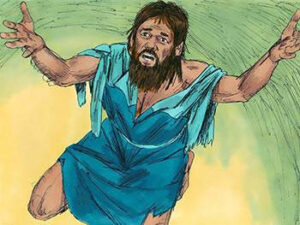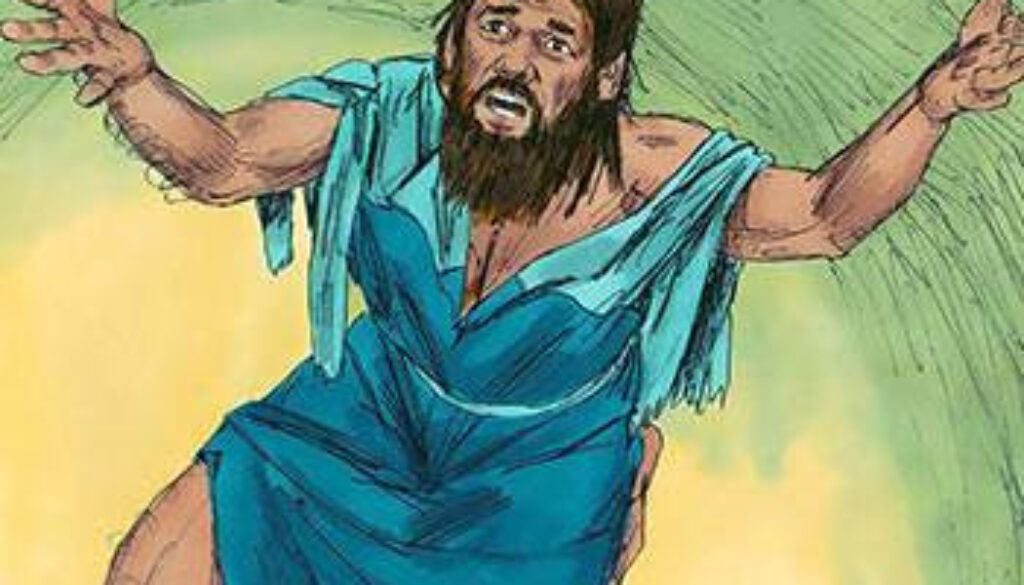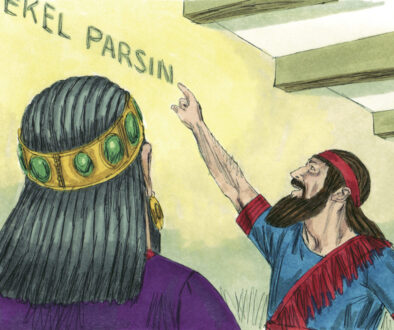Ezra 9:1-15 Heartsick

Ezra has come home to teach the people the Laws of God. He is heartsick over what he finds. Even the teachers are disobeying God’s Laws.
We last saw Ezra and his band of returnees beginning to integrate into the Jewish society. They even made their first sacrifice in the Temple. Ezra also went to show the ‘neighbors’ the decree of support that King Artaxerxes sent with him. Everything is looking good; or is it. Let’s rejoin our story and see how things are going.
♥ ♦ ♥
Ezra’s last stop on visiting the people beyond the river is in Samaria. This was once the capital of the northern kingdom of Israel. The people who were left in the land after Israel fell have left descendants here. They are a mixed people. His heart breaks for them. No longer are they a pure race, the people God called them to be. But neither are they the ones he has come specifically to teach. He delivers the decree from the king and makes his way back to Jerusalem.
It has been two months since the great sacrifice was offered by Ezra and the returnees. He is ready to begin his real work; the work he KNOWS he has been called to and preparing for all his life. He is ready to teach the people God’s Law.
Ezra’s fame has spread throughout the land. He is only the second man to be so favored by the Persian kings that he released the people. Everyone wants to hear from him. His first meeting is scheduled to take place at midday in the courtyard of the Temple three days after he returned from visiting Samaria. People have come from all over Judah to hear him speak.
The courtyard begins filling at first light. Many people have chosen to attend the morning sacrifice since they are in Jerusalem. Ezra is in attendance and is thrilled to see so many people taking part. There is no part for the people to play in this sacrifice beyond observing. They are free to worship the Lord during but are to refrain from distracting the priests for their duties.
Ezra watches as the lamb is brought in, slaughtered, dressed and laid upon the altar. He reflects on the gift that this lamb has given in surrendering his life. His blood will cover the sins of the people and allow the Lord to dwell with His people. This twice daily ritual demonstrates the people’s commitment to their God. It does Ezra’s heart good to see it practiced and so well attended.
After the sacrifice is completed, Ezra returns to his room for further refinement of his upcoming remarks. He wants to make certain he speaks ONLY the words the Lord would have him speak. He remains here until nearly time to stand before the people.
While Ezra is preparing the people are gathering. More and more people make their way into the courtyard. It is a large space but it is filling up quickly. It is near capacity by the time Ezra makes his way to the steps of the Temple. This is where he will stand to introduce himself to the people and share his message.
The crowd is jockeying for position when Ezra steps onto the front steps of the Temple. The people quickly turn their attention to him and stay wherever they are, for now. The noise in the crowd also dies down to an almost imperceptible level. Ezra is pleased to see so many in attendances. He had secretly feared that no one would come. He begins his first teaching.
“I want to first say how pleased I am to have all of you in attendance today. I know many of you have traveled a great distance to be here. This is not always going to be the norm for you as I plan to visit your cities and towns as well. I intend to bring the Laws of God to the very houses of His people. Judges and magistrates will also be appointed who will follow the Laws of our God when rendering judgment. The king of Persia has empowered me to do this.
For today, I want to touch on the MOST IMPORTANT Law of our God. That Law is that we should serve Him only and above all else. This has been Israel’s greatest sin. Our fathers turned from the Lord our God. They began this turning away when they began to intermarry with the nations the Lord had sent us into the land to dispossess it. Even before entering the land of promise, the people demonstrated how dangerous this was. When the daughters of Moab began to turn the hearts of their husbands of Israel to their gods the Lord was exceedingly angry. The Lord judged the people and punished them by removing all who practiced such abominations.
King Solomon, through all his foreign wives reintroduced other gods into our midst. Their presence in the land was in direct relationship to his intermarrying with other nations. The Lord our God calls us to be separate and to remain so, not giving our sons as husbands to other nations or taking their daughters for our sons. This is a hard, fast rule of our Lord. And it is a simple thing we can do to show our commitment to Him. It is the ‘locking of the gate’ to other gods.”
As Ezra spoke there was a mixed reaction in the crowd. Some were angry with him for taking this hard line. Some were in complete support of his point. Some felt condemned by his words as their lives went against his words. And some felt he must be crazy to speak such things. But deep within the hearts of ALL those who had learned of the Lord God of Israel in their youth, this message struck a chord. None dared to raise their voice though.
After Ezra had dismissed the crowd many people hung back so they could speak with him. Among those were a group of officials. They had firsthand news Ezra should be made aware of. They knew he would not be pleased but the content of his FIRST teaching impressed upon them the seriousness of this issue.
The group approaches Ezra and he turns to them with an eager face. He is interested to hear what they took away from the message the Lord laid on his heart.
“Rabbi Ezra, may we speak frankly with you?”
“Please do.”
“The people of Israel and the priests and the Levites have no separated themselves from the peoples of the land with their abominations, from the Canaanites, the Hittites, the Perizzites, the Jebusites, the Ammonites, the Moabites, the Egyptians, and the Amorites. For they have taken some of their daughters to be wives for themselves and for their sons, so that the holy race has mixed itself with the peoples of the lands. And in the faithlessness the hand of the officials and chief men have been foremost” (verses1b-2).
Ezra’s anguish began to mount as the deeds of the nation were made known to him. The final straw of even the leaders and leading men engaging in these practices completely undone him. Ezra grasped his clothing about the neck and with a forceful cry he pulled violently on them, tearing all layers in his anguish. He continued to cry out in the deepest despair. He grabbed handfuls of his own hair and yanked them from his head and beard. He then fell to his knees sobbing.
The officials who had brought this to his attention were stunned at his reaction. Seeing him in such obvious pain moved them also but they had no words of comfort to offer him. All they could do was stand silent witness.
Ezra remained in this same position, head bowed and tears streaming down his face the rest of the day. He did not move an inch. And his sobs echoed throughout the courtyard. No one dared approach him.
As the time for the evening sacrifice drew near the priests spoke among themselves.
“What should we do? Do we delay the sacrifice?”
“I think that would upset him even more. It would possibly anger the Lord too. We will work around master Ezra without directly disturbing him.”
The decision made, the priest prepared the evening sacrifice paying as little attention to Ezra as possible. Those who had gathered in attendance of the sacrifice were instructed not to disturb him either. The men and women tried to avert their eyes from the man sobbing in the courtyard but the children openly gawked at him. They didn’t know what to think. Their parents restrained them from approaching him, even if they couldn’t keep them from watching.
As soon as the lamb was laid on the fire Ezra rose, made his way before the altar and fell on his knees. He spread his hands wide and hung his head before calling out to the Lord. In a voice choked with sorrow he began to petition the Lord.
“O my God, I am ashamed and blush to life my face to you, my God, for our iniquities have risen higher than our heads, and our guilt has mounted up to the heavens. From the days of our fathers to this day we have been in great guilt. And for our iniquities we, our kings, and our priests have been given into the hand of the kings of the lands, to the sword, to captivity, to plundering, and to utter shame,…” Ezra’s shoulders slumped as he uttered, “…as it is today.” Hope filled his voice as he continued. “But now for a brief moment favor has been shown by the Lord our God, to leave us a remnant and to give us a secure hold within His holy place, that our God my brighten our eyes and grant us a little reviving in our slavery. For we are slaves. Yet our God has not forsaken us in our slavery, but has extended to us His steadfast love before the kings of Persia, to grant us some reviving to set up the house of our God, to repair its ruins, and to give us protection in Judea and Jerusalem.”
With a voice full of shame and hands spread wide as if posing a most genuine pleading question, Ezra continues. “And now. O our God, what shall we say after this? For we have forsaken Your commandments, which You commanded by Your servants the prophets. Saying, ‘The land that you are entering, to take possession of it, is a land impure with the impurity of the peoples of the lands, with their abominations that have filled it from end to end with their uncleanness. Therefore do not give your daughters to their sons, neither take their daughters for your sons, and never seek their peace or prosperity, that you may be strong and eat the good of the land and leave it for an inheritance to your children forever.’”
Righteous anger filled his voice as he proclaimed the guilt and just punishment of the people. “And after all that has come upon us for our evil deeds and for our great guilt, seeing the You, our God, have punished us less than our iniquities deserve and have given us such a remnant as this, shall we break Your commandments again and intermarry with the peoples who practice these abominations? Would You not be angry with us until You consumed us, to that there should be no remnant, nor any to escape?”
Ezra’s voice became one of pleading for mercy. “O Lord, the God of Israel, You are just, for we are left a remnant that has escaped, as it is today. Behold, we are before you in our guilt, for none can stand before You because of this” (verses 6-15, emphasis added).
Ezra was spent. He had poured out his whole heart in supplication before the Lord. And as he prayed the people of Israel began to gather with him, weeping bitterly for they saw their sin clearly. As the aroma of the evening sacrifice rose before the Lord, so did the prayers of His people.
(to be continued)
♥ ♦ ♥
One thing that struck me about Ezra’s prayer is that he included himself while pleading before the Lord. He didn’t say, “Those who came before me” or “these people”. He claimed the sin as his own, even though he had not taken part in it. He pleaded for the people as if pleading for his own sake. He didn’t try and condemn his brothers and hold himself above them. And his heart touched those around him.
Ezra linked his future with Israel’s. He drew no safety net about himself. He placed ALL of them in the hands of the Lord. And he let God work on their hearts.
Father God, thank You that You judge each heart. But my end is tied to that of others. I’m responsible for the message I put out in Your name. If I purposefully lead people astray, I’m responsible for their acting on it. But I know the reverse is true too. If I am faithful and put forth Your truth, You will bring the harvest and the reward. That is my aim Lord. To always speak Your truth in LOVE.
One of those truths is that it still matters; intermarrying. Not intermarrying with other physical races but spiritual foundations. One will drag the other down or introduce beliefs that are foreign to the gospel of Jesus Christ. That is why Paul says not to be “unequally yoked” with one another. I fell into that trap Father. Thank You for rescuing me from my sin. NOT that You dissolved my marriage but that You protected me from evil even while is dissolved around me. Thank You for Your grace and mercy!



